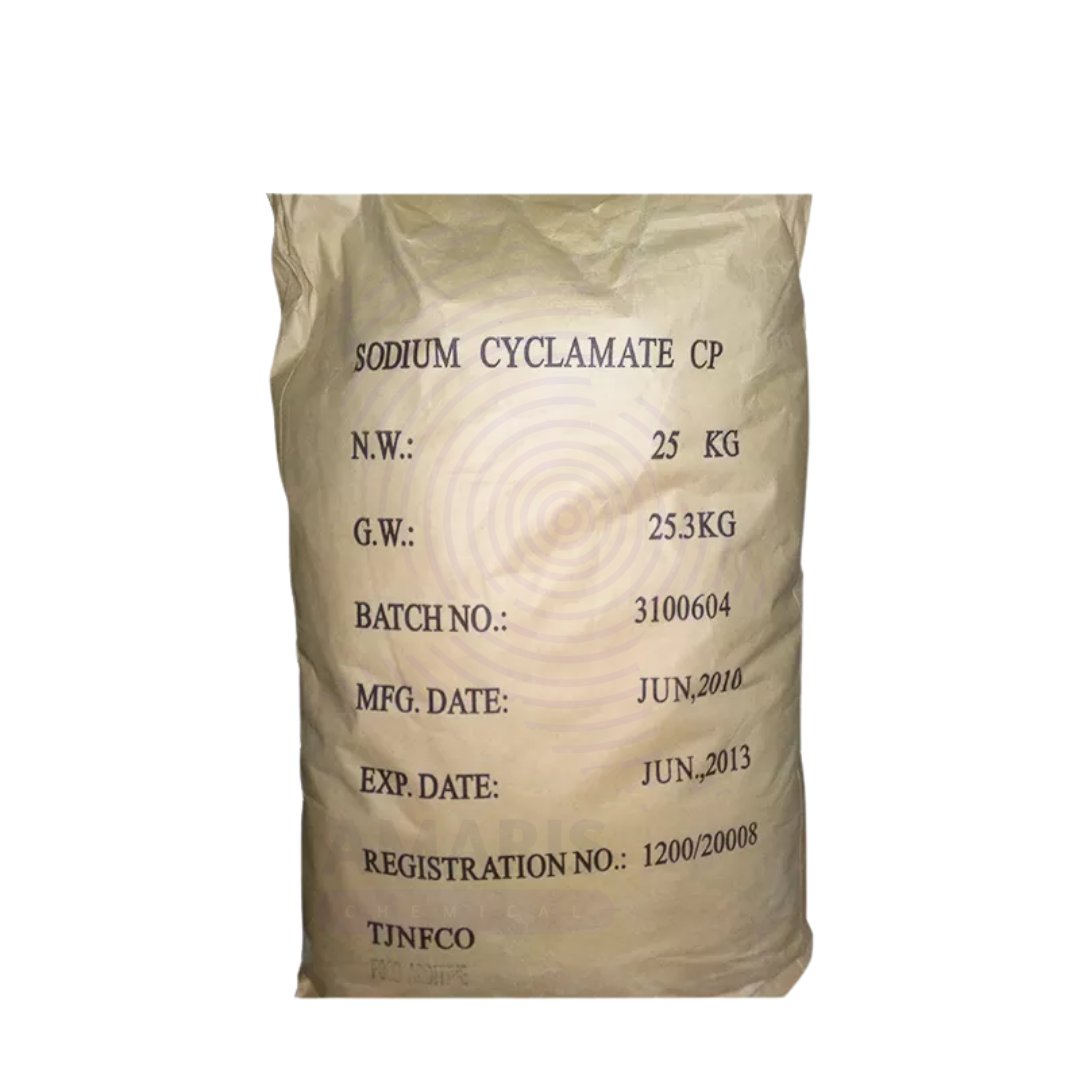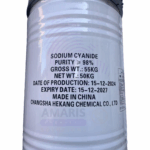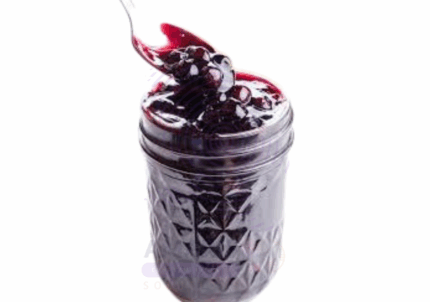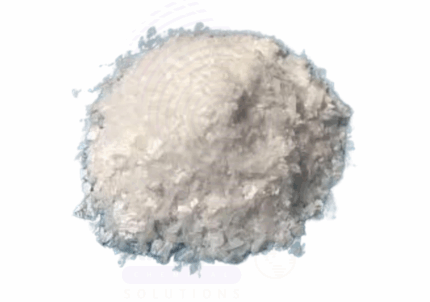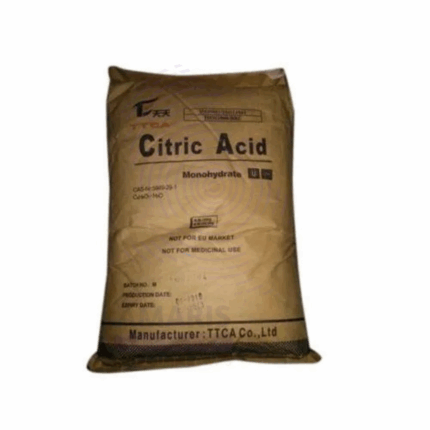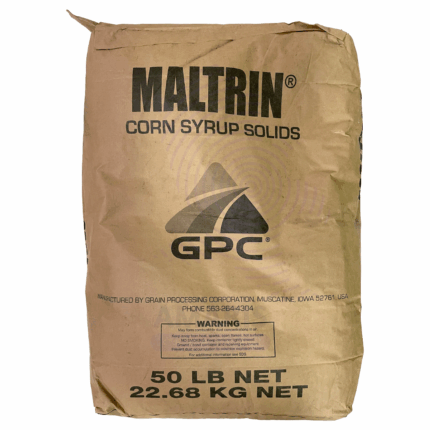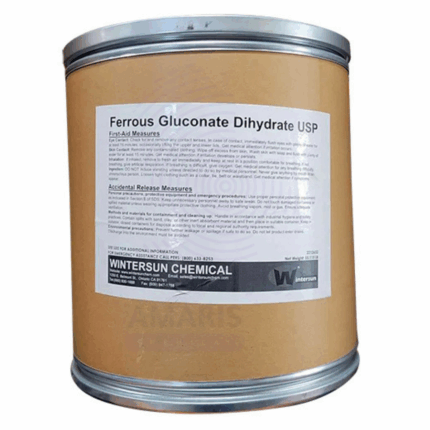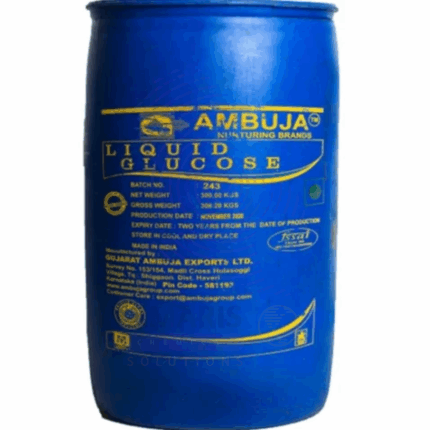Sodium Cyclamate
Whatsapp Order
Sodium Cyclamate 80 Mesh is a white, crystalline powder used as an artificial sweetener. It is approximately 30 to 50 times sweeter than sucrose (table sugar) and provides a low-calorie sugar substitute. Due to its high sweetness and stability under heat and acidic conditions, it is commonly used in food and beverage formulations, pharmaceuticals, and personal care products as a sugar alternative.
Category: Sweeteners
Tags: Artificial sweetener, Food additive, Nutraceuticals, Pharmaceutical industry, Sodium Cyclamate
Description
Table of Contents
Toggle
Sodium Cyclamate 80 Mesh
Primary Uses
- Food & Beverage Industry
- Used as a non-nutritive sweetener in soft drinks, diet beverages, and sugar-free foods.
- Employed in baked goods, candies, and desserts to reduce caloric content without compromising sweetness.
- Suitable for tabletop sweeteners and powdered drink mixes.
- Pharmaceuticals
- Incorporated in syrups, chewable tablets, and oral hygiene products to improve taste without sugar.
- Used in formulations requiring low-calorie sweetening agents.
- Personal Care Products
- Used in toothpaste, mouthwash, and other oral care products as a sweetening agent.
Secondary Uses
- Dietary Supplements
- Added to vitamin and mineral supplements to mask unpleasant tastes.
- Animal Feed
- Occasionally used as a sweetener to enhance palatability in feed additives.
- Cosmetics
- Incorporated in flavored lip balms and skincare products.
KEY PRODUCT FEATURES
1. Basic Identification Attributes
- Chemical Name (IUPAC): Sodium cyclohexanesulfamate
- Common/Trade Name: Sodium Cyclamate
- CAS Number: 106-47-8
- HS Code: 2925.29
- Synonyms: Cyclamic acid sodium salt, E952
2. Physical & Chemical Properties
- Physical State: Powder
- Color & Odor: White, odorless
- Particle Size: 80 mesh (approximately 180 microns)
- Solubility: Highly soluble in water
- Density: Approx. 1.4 g/cm³
3. Safety & Hazard Attributes
- GHS Classification: Generally regarded as safe at approved concentrations; may cause sensitivity in some individuals
- Toxicity: Low acute toxicity; long-term effects under regulatory review in some countries
- Exposure Limits: Follow regulatory guidelines and food safety standards
4. Storage & Handling Attributes
- Storage Conditions: Store in a cool, dry place in tightly closed containers away from moisture and strong oxidizers
- Container Type: Bags, drums, or food-grade packaging
- Shelf Life: Typically 2–3 years if stored properly
- Handling Precautions: Use standard hygiene practices; avoid dust generation
5. Regulatory & Compliance Attributes
- Approved by FDA, EFSA, and many international food safety authorities for use as a sweetener
- Complies with food additive regulations (e.g., Codex Alimentarius, FCC)
- Listed as E952 in the European Union
6. Environmental & Health Impact
- Biodegradability: Readily biodegradable
- Ecotoxicity: Low environmental impact when disposed of properly
- Bioaccumulation: Not significant
SAFETY HANDLING PRECAUTIONS
Safety Handling Precautions
- PPE Required: Use dust masks if dust formation is significant; gloves recommended
- Handling Guidelines: Avoid inhalation of dust; maintain good ventilation
- Storage Measures: Keep containers tightly sealed and stored in a dry environment
First Aid Measures
- Inhalation: Move to fresh air; seek medical attention if respiratory irritation occurs
- Skin Contact: Wash with soap and water if irritation develops
- Eye Contact: Rinse with water for several minutes; seek medical advice if irritation persists
- Ingestion: Rinse mouth; not expected to be harmful in typical exposure; seek medical advice if large quantities ingested
Firefighting Measures
- Fire Hazards: Non-flammable
- Extinguishing Media: Water spray, foam, dry chemical, or CO₂ as appropriate
- Special Precautions: None specific
- Hazardous Combustion Products: May emit sulfur oxides if decomposed by fire
Related products
Blueberry Toppings
Blueberry Toppings are sweet, fruit-based condiment preparations made primarily from blueberries, sugar, and thickening agents. They are characterized by a vibrant blue-purple color, fruity aroma, and a sweet-tart flavor profile. Typically semi-viscous with chunks or pureed pieces of blueberry, these toppings are used as finishing ingredients in desserts, breakfast foods, and beverages. Blueberry toppings may be prepared as preserves, syrups, or glazes and often contain natural flavors and preservatives to enhance shelf life and sensory appeal.
Calcium Saccharin
Calcium Saccharin is the calcium salt form of saccharin, a synthetic sweetener. It appears as a white to off-white crystalline powder with a sweet taste that is several hundred times sweeter than sucrose (table sugar). Calcium Saccharin is water-soluble and widely used as a non-nutritive sweetener in food and beverage products, pharmaceuticals, and oral care formulations. Due to its stability under heat and acidic conditions, it is ideal for baked goods and beverages. It serves as a sugar substitute for diabetic and calorie-restricted diets and is often used in combination with other sweeteners to improve taste profiles.
Citric Acid Monohydrate
Citric Acid Monohydrate is a white, crystalline powder or granule form of citric acid containing one molecule of water per molecule of acid. It is a natural organic acid commonly derived from citrus fruits or produced by fermentation processes. Citric Acid Monohydrate is widely used as an acidulant, preservative, and chelating agent in various industries. Compared to the anhydrous form, it has a slightly lower acid concentration due to the water molecule but offers excellent solubility and stability. It is prized for its sour flavor, buffering capacity, and ability to bind metal ions, making it indispensable in food, pharmaceutical, cosmetic, and industrial applications.
Corn Syrup
Corn Syrup is a viscous, sweet liquid derived from the enzymatic hydrolysis of corn starch. It consists primarily of glucose and maltose along with higher saccharides, providing sweetness, viscosity, and moisture retention in food formulations. Corn Syrup is widely used in food and beverage industries as a sweetener, humectant, and texture enhancer. Its ability to prevent crystallization and retain moisture makes it essential in confectionery, baking, and processed foods. Industrial grades of corn syrup are also used in pharmaceuticals and other manufacturing applications where its binding and stabilizing properties are valued.
Ferrous Gluconate
Ferrous Gluconate is an iron salt of gluconic acid, appearing as a pale greenish-blue or green crystalline powder or granules. It is widely used as a nutritional iron supplement and food additive due to its good bioavailability and relatively low toxicity compared to other iron salts. Ferrous Gluconate is water-soluble, providing a stable source of ferrous iron (Fe²⁺) that is easily absorbed in the gastrointestinal tract. This compound is commonly employed in pharmaceuticals, food fortification, and medical formulations to treat or prevent iron deficiency anemia. It is also used as a reducing agent and color stabilizer in various industrial applications.
Liquid Glucose
$ 1.15
Liquid Glucose is a viscous, clear to pale amber syrup primarily composed of glucose and other saccharides. It is produced by the enzymatic hydrolysis of starch derived from corn, wheat, or potatoes. Known for its high sweetness and excellent moisture-retention properties, Liquid Glucose is widely used in the food and beverage industry to enhance texture, sweetness, and shelf life. It also acts as a humectant and crystallization inhibitor, improving the quality and consistency of various processed foods.
Sucralose
Sucralose is a high-intensity, zero-calorie artificial sweetener derived from sucrose through selective chlorination. It is approximately 600 times sweeter than sugar, making it an effective sugar substitute in a wide range of food and beverage applications. Sucralose is stable under heat and across a broad pH range, suitable for cooking, baking, and long shelf-life products. It delivers sweetness without calories or glycemic impact, favored in health-conscious and diabetic-friendly formulations.
Sucrose
Sucrose, commonly known as table sugar, is a natural disaccharide composed of glucose and fructose. It is a widely used sweetening agent in food and beverages, known for its clean, sweet taste and excellent solubility in water. Supplied in 25kg bags, sucrose serves as a key ingredient in cooking, baking, and industrial applications. It also functions as a preservative, texture enhancer, and fermentation substrate in various industries.


 Preservatives(food)
Preservatives(food) Flavor Enhancers
Flavor Enhancers Acidulants
Acidulants Sweeteners
Sweeteners Antioxidants
Antioxidants Colorants(food)
Colorants(food) Nutraceutical Ingredients (food)
Nutraceutical Ingredients (food) Nutrient Supplements
Nutrient Supplements Emulsifiers
Emulsifiers
 Collectors
Collectors Dust Suppressants
Dust Suppressants Explosives and Blasting Agents
Explosives and Blasting Agents Flocculants and Coagulants
Flocculants and Coagulants Frothers
Frothers Leaching Agents
Leaching Agents pH Modifiers
pH Modifiers Precious Metal Extraction Agents
Precious Metal Extraction Agents
 Antioxidants(plastic)
Antioxidants(plastic) Colorants (Pigments, Dyes)
Colorants (Pigments, Dyes) Fillers and Reinforcements
Fillers and Reinforcements Flame Retardants
Flame Retardants Monomers
Monomers Plasticizers
Plasticizers Polymerization Initiators
Polymerization Initiators Stabilizers (UV, Heat)
Stabilizers (UV, Heat)
 Antifoaming Agents
Antifoaming Agents Chelating Agents
Chelating Agents Coagulants and Flocculants
Coagulants and Flocculants Corrosion Inhibitors
Corrosion Inhibitors Disinfectants and Biocides
Disinfectants and Biocides Oxidizing Agents
Oxidizing Agents pH Adjusters
pH Adjusters Scale Inhibitors( water)
Scale Inhibitors( water)
 Antioxidants(cosmetic)
Antioxidants(cosmetic) Emollients
Emollients Fragrances and Essential Oils
Fragrances and Essential Oils Humectants
Humectants Preservatives
Preservatives Surfactants(cosmetic)
Surfactants(cosmetic) Thickeners
Thickeners UV Filters
UV Filters
 Fertilizers
Fertilizers Soil Conditioners
Soil Conditioners Plant Growth Regulators
Plant Growth Regulators Animal Feed Additives
Animal Feed Additives Biostimulants
Biostimulants Pesticides (Herbicides, Insecticides, Fungicides)
Pesticides (Herbicides, Insecticides, Fungicides)
 Active Pharmaceutical Ingredients (APIs)
Active Pharmaceutical Ingredients (APIs) Excipients
Excipients Solvents(pharmaceutical)
Solvents(pharmaceutical) Antibiotics
Antibiotics Antiseptics and Disinfectants
Antiseptics and Disinfectants Vaccine Adjuvants
Vaccine Adjuvants Nutraceutical Ingredients (pharmaceutical)
Nutraceutical Ingredients (pharmaceutical) Analgesics & Antipyretics
Analgesics & Antipyretics
 Analytical Reagents
Analytical Reagents Solvents(lab)
Solvents(lab) Chromatography Chemicals
Chromatography Chemicals Spectroscopy Reagents
Spectroscopy Reagents microbiology-and-cell-culture-reagents
microbiology-and-cell-culture-reagents Molecular Biology Reagents
Molecular Biology Reagents Biochemical Reagents
Biochemical Reagents Inorganic and Organic Standards
Inorganic and Organic Standards Laboratory Safety Chemicals
Laboratory Safety Chemicals Specialty Laboratory Chemicals(Special Laboratory Equipment)
Specialty Laboratory Chemicals(Special Laboratory Equipment)
 Demulsifiers
Demulsifiers Hydraulic Fracturing Fluids
Hydraulic Fracturing Fluids Scale Inhibitors(oil)
Scale Inhibitors(oil) Surfactants(oil)
Surfactants(oil) Drilling Fluids
Drilling Fluids
 Dyes and Pigments
Dyes and Pigments Bleaching Agents
Bleaching Agents Softening Agents
Softening Agents Finishing Agents
Finishing Agents Antistatic Agents
Antistatic Agents
 Admixtures
Admixtures Waterproofing Agents
Waterproofing Agents Sealants and Adhesives
Sealants and Adhesives Curing Compounds
Curing Compounds Concrete Repair Chemicals
Concrete Repair Chemicals Anti-Corrosion Coatings
Anti-Corrosion Coatings
 Surfactants(cleaning)
Surfactants(cleaning) Builders
Builders Enzymes
Enzymes Solvents (Cleaning)
Solvents (Cleaning) Fragrances
Fragrances
 Electronic Chemicals
Electronic Chemicals Catalysts
Catalysts Lubricants
Lubricants Photographic Chemicals
Photographic Chemicals Refrigerants
Refrigerants Automotive chemicals
Automotive chemicals Pyrotechnic Chemicals
Pyrotechnic Chemicals
 Biodegradable Surfactants
Biodegradable Surfactants Bio-based Solvents
Bio-based Solvents Renewable Polymers
Renewable Polymers Carbon Capture Chemicals
Carbon Capture Chemicals Wastewater Treatment Chemicals
Wastewater Treatment Chemicals
 Pigments
Pigments Solvents(paint)
Solvents(paint) Specialty Coatings
Specialty Coatings Binders/Resins
Binders/Resins Additives
Additives Driers
Driers Anti-Corrosion Agents
Anti-Corrosion Agents Functional Coatings
Functional Coatings Application-Specific Coatings
Application-Specific Coatings
 Fresh Herbs
Fresh Herbs Ground Spices
Ground Spices Whole Spices
Whole Spices Spice Blends
Spice Blends Dried Herbs
Dried Herbs
 Leavening Agents
Leavening Agents Dough Conditioners
Dough Conditioners Flour Treatments
Flour Treatments Fat Replacers
Fat Replacers Decoratives
Decoratives Preservatives(baking)
Preservatives(baking)
 Plasticizers & Softeners
Plasticizers & Softeners Reinforcing Agents
Reinforcing Agents Adhesion Promoters
Adhesion Promoters Vulcanizing Agents
Vulcanizing Agents Antidegradants
Antidegradants Blowing Agents
Blowing Agents Fillers & Extenders
Fillers & Extenders Accelerators & Retarders
Accelerators & Retarders